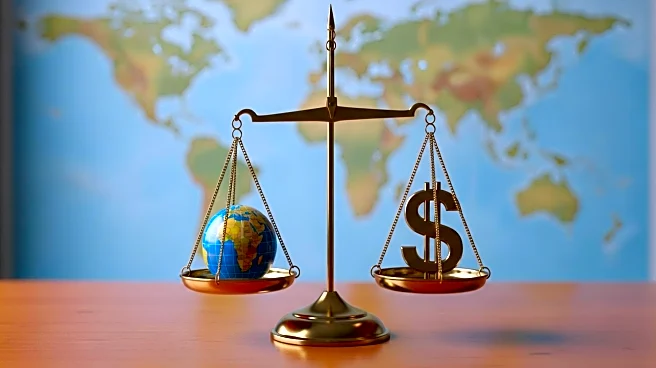What's Happening?
President Trump has imposed a 50% tariff on Indian exports to the United States, significantly impacting trade relations between the two countries. This decision follows India's purchase and refinement of Russian oil during the ongoing conflict in Ukraine, which Trump views as war profiteering. The tariffs, initially set at 25%, were doubled as a punitive measure against India. This move has strained the diplomatic relationship between the U.S. and India, undermining Prime Minister Narendra Modi's efforts to establish a strong partnership with the U.S. The tariffs make Indian exports uncompetitive in the U.S. market, challenging India's economic strategy and its geopolitical positioning.
Why It's Important?
The imposition of high tariffs by President Trump on Indian exports has significant implications for U.S.-India relations and global trade dynamics. Economically, the tariffs threaten India's export market in the U.S., potentially leading to financial losses for Indian businesses and affecting bilateral trade. Politically, this development highlights the challenges India faces in balancing its strategic autonomy with its aspirations for closer ties with the U.S. The tariffs could also influence India's foreign policy decisions, as it navigates its role in a multipolar world. The situation underscores the complexities of international diplomacy and trade under President Trump's administration.
What's Next?
India may need to reassess its trade and diplomatic strategies in response to the tariffs imposed by President Trump. Potential next steps could include seeking negotiations to reduce the tariffs or exploring alternative markets to mitigate the economic impact. Additionally, India might strengthen its alliances with other countries to counterbalance the strained relations with the U.S. The situation could prompt discussions within India's political circles about the future direction of its foreign policy, particularly in relation to the U.S. and its strategic autonomy.
Beyond the Headlines
The tariff imposition by President Trump reflects broader geopolitical shifts and the rise of protectionist policies in Western countries. This development may signal a trend towards increased economic nationalism, affecting global trade patterns and international relations. The situation also highlights the challenges faced by non-Western countries like India in navigating their geopolitical positioning amidst changing global dynamics. The long-term implications could include shifts in global alliances and the reevaluation of trade policies by affected nations.











